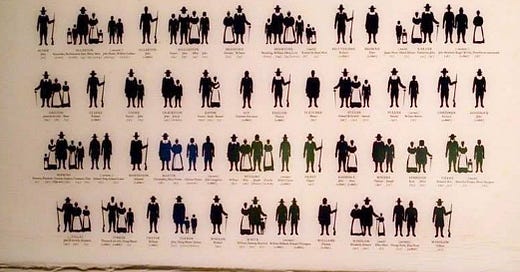Earlier today I came across the following chart from the Pilgrim Institute, posted on the social media account of a friend. It showed the various family groupings that came over on the Mayflower … and then which members of those same families made it to the first Thanksgiving in 1621. Needless to say, it puts a vastly different spin on the Thanksgiving celebration than the turkey, potatoes, and cranberry affair we view it as today.
I kept pondering this chart through the day, thinking about the many men and women who came to this country, seeking a new life, but were instead snuffed out within a matter of months, many of them likely at ages younger than my own. What a waste.
Such waste reminded me of some of the things I’ve been seeing lately in the news, largely related to the various riots our country experienced a few years ago. Although official narratives of those events have told one story for the last few years, evidence is now emerging which strongly suggests that many key players in those events were unjustly accused, harassed, and even imprisoned. Such injustice grieves many hearts, including mine. What a waste.
But let’s leave historical and national problems alone for a moment and focus on the personal. We likely all have personal life disappointments, secret griefs, and heavy cares due to work, family, or financial issues. Ambitions are crushed, betrayal happens, and crises arise. It’s all too easy to look back at them, shake our heads and say, “What a waste.”
But then I thought of the Pilgrims again. Were all those lives wasted, snuffed out before they could even enjoy the celebration which has now become a yearly American ritual? No, they weren’t, I thought.
Their deaths may have been untimely, but their lives weren’t in vain. Indeed, the journey that led to their deaths was a journey that laid the foundation for a great nation—a nation whose freedoms and benefits we have all enjoyed. The seed of their death bore great fruit, so no, their lives weren’t a waste.
The same is true for those unjustly accused in our nation today, or even for ourselves as we struggle through our individual problems. Are such troubles hard? Undoubtedly. But are they in vain or a waste? No, because such troubles build character or can be used at some future date in the lives of others—particularly when we respond with joy and gratitude.
“When upon life's billows you are tempest tossed / When you are discouraged, thinking all is lost,” the old hymn goes, continuing on to ask, “Are you ever burdened with a load of care? / Does the cross seem heavy you are called to bear?”
We could probably all answer yes to those questions—as could the politically oppressed and others through the ages of our nation’s history.
The solution for such feelings of woe, the song goes on to answer, is to “count your blessings, name them one by one … and it will surprise you what the Lord has done.”
The fact is, the trials and difficulties and the deaths and disappointments of this life are not a waste simply for the reason that God is sovereign. He is in control, and although He does not cause the evil we experience here on this earth, He is a master at using such problems for good. As the last verse of the aforementioned hymn says:
“So, amid the conflict, whether great or small / Do not be discouraged, God is over all.”
Yes, count your many blessings—even those that don’t seem like much of a blessing on the surface—for in the sovereignty of God, nothing is a waste.
—




A truly eloquent expression of faith and gratitude.
Thank you, Annie.
Exactly! This reminds me of a William Cowper poem/hymn:
Judge not the Lord by feeble sense, but trust him for his grace; behind a frowning providence, he hides a smiling face.
Cowper suffered greatly in his lifetime, but yet knew nothing escapes our Sovereign Lord, Amen!